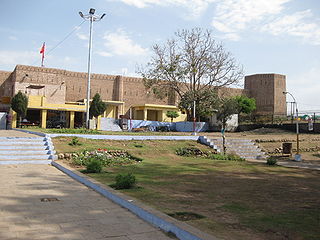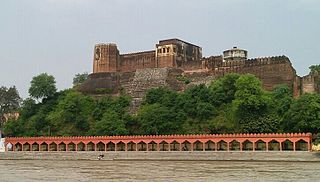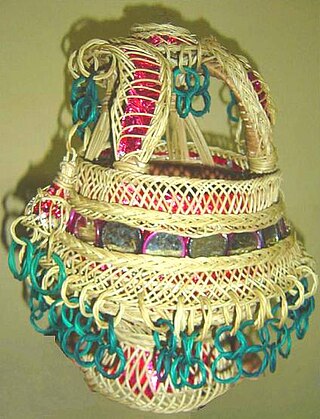Related Research Articles

Maharaja Sir Hari Singh was the last ruling Maharaja of the princely state of Jammu and Kashmir.

Kathua is a city and municipal council of the Jammu division of Indian-administered Jammu and Kashmir in the disputed Kashmir region. The city is the headquarters of Kathua district and is divided into 27 wards which constitute the Kathua Municipal Council. It is situated along NH-44 The city has a bustling industrial area and an army cantonment adjoining it. Being a transit hub for industrial activity in the state, the city has a large industrial base with textile park, Biotechnology and Pharma industrial and research park, Cement industry and many medium scale MSMEs.

Jammudistrict is an administrative district of the Jammu division of Indian-administered Jammu and Kashmir in the disputed Kashmir region. It is the most populous district in the Jammu division.

Poonch or Punch is a district of the Jammu division of Indian-administered Jammu and Kashmir in the disputed Kashmir region. With headquarters in the town of Poonch, it is bounded by the Line of Control on three sides. The 1947–48 war between India and Pakistan divided the earlier district into two parts. One went to Pakistan and the other became part of the then-Indian state of Jammu and Kashmir.

Akhnoor is a city and municipal committee, near city of Jammu in Jammu district of Indian union territory of Jammu and Kashmir. It lies 28 km away from Jammu city. Akhnoor is on the bank of the Chenab River, just before it enters the Pakistani Punjab. Its border location gives it strategic significance. The Akhnoor area is divided into three administrative sub-divisions - Akhnoor, Chowki Choura and Khour; Seven Tehsils - Akhnoor Khaas, Chowki Choura, Maira Mandrian, Jourian, Kharah Balli, Khour & Pargwal.
Nagrota is a town located in the Jammu district of Jammu and Kashmir in India. It is located on National highway 44 between Jammu city and Udhampur. It is situated on the bank of River Tawi. Nagrota along with Kashmiri Pandit Migrant town of Jagti straddle the national highway. Nagrota is the first shrine stoppage for Shri Mata Vaishno Devi. The Kol-Kandoli temple is a mandate for completing the Shri Mata Vaishno Devi pilgrimage. Nagrota has an extension of Jammu Industries having Oil Depots and Godowns.It serves as headquarter of the XVI Corps (India) also known as the 'White Knight Corp'.
The Chicken's Neck, or the Akhnoor Dagger, is the name for a narrow strip of Pakistani territory that extends into the Indian administered-Jammu and Kashmir south of Akhnoor. This sensitive piece of land, which lies on the de facto Indo–Pakistani border on the west side of the disputed region of Kashmir, is part of Punjab Province's Sialkot District and measures roughly 170 km2 (66 sq mi). It has been a focal point in all the wars between India and Pakistan, as it is seen as a corridor towards most of Jammu and Kashmir. One of the main thrusts of Operation Grand Slam in the Indo-Pakistani War of 1965 was to capture Akhnoor through the Chicken's Neck, which could potentially have choked the Indian Army in the region; however, the plan failed.

A kanger is an earthen pot woven around with wicker filled with hot embers used by Kashmiris beneath their traditional clothing pheran to keep the chill at bay, which is also regarded as a work of art. It is normally kept inside the pheran, the Kashmiri cloak, or inside a blanket. It is mostly used in the cold nights of Chillai Kalan. If a person is wearing a jacket, it may be used as a hand warmer. It is about 6 inches (150 mm) in diameter and reaches a temperature of about 150 °F (66 °C). It comes in different variants, small ones for children and large ones for adults.
Chowki Choura, Akhnoor, is a Sub-Division in Jammu district in Jammu and Kashmir, India.
Kaleeth is a village panchayat located in the Jammu district in the union territory of Jammu and Kashmir, India. Located 40 km (25 mi) from Jammu, Kaleeth is located in the foothills of the Himalayas. It is also part of proposed Jammu–Poonch line.
Khush Roi Kalan is a village in Srigufwara tehsil of Anantnag district in the Kashmir Valley of the Indian union territory of Jammu and Kashmir.
St. Francis Higher Secondary School is a Roman Catholic School situated in Akhnoor, Jammu.
Dehargaha is a village in the northern union territory of Jammu and Kashmir, India. It is located in the Akhnoor taluk of Jammu district.
Barnoti is a town and a newly created naib tehsil in Kathua district in the union territory of Jammu and Kashmir, India. It is situated on the NH 1A, 13 km from District Headquarter.
National Highway 144A is a national highway in the union territory of Jammu and Kashmir in India. NH-144A is a spur road of National Highway 44 that runs between Jammu and Poonch and is only source of transport for towns including Akhnoor, Sunderbani, Kalakote, Naushera and Rajouri. Many more towns of Rajouri and Poonch district are connected with NH-144A via single or double lane roads.
Kanachak is an area/sector of Akhnoor Tehsil, Jammu district, Jammu and Kashmir, India. It lies along the international border (IB) with Pakistan.

Dhalan is a village located on a river bank in Jammu district of Jammu and Kashmir union territory of India. Dhalan is located on the India-Pakistan LoC, which begins just north of Dahlan. The important geostrategic Chicken's Neck military sector of Pakistan lies southeast of Dhalan.
Akhnoor Assembly constituency is one of the 90 constituencies in the Jammu and Kashmir Legislative Assembly of Jammu and Kashmir a north state of India. Akhnoor is also part of Jammu Lok Sabha constituency.
Rajeev Sharma is an Indian politician from Jammu and Kashmir. He was a former MLA from Akhnoor Assembly constituency in Jammu district. He won the 2014 Jammu and Kashmir Legislative Assembly election representing the Bharatiya Janata Party.
Mohan Lal is an Indian politician from Jammu & Kashmir. He is a Member of the Jammu & Kashmir Legislative Assembly from 2024, representing Akhnoor Assembly constituency as a Member of the Bharatiya Janta Party.
References
- ↑ "Bharda Kalan, Akhnoor, Jammu, Jammu and Kashmir, India - Geolysis Local". geolysis.com. Retrieved 8 January 2025.
- ↑ "Bharda Kalan, Jammu, Jammu and Kashmir, India - eBird Hotspot". ebird.org. 2 October 2024. Retrieved 8 January 2025.